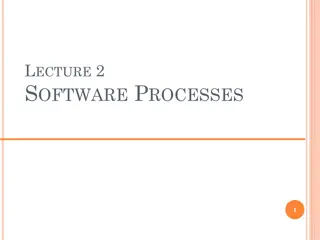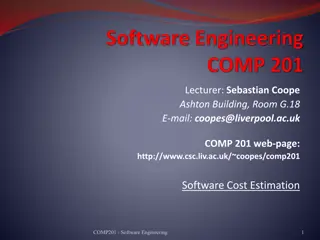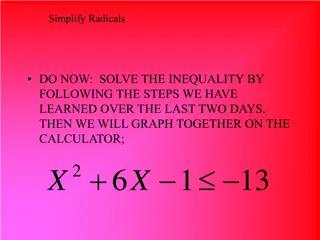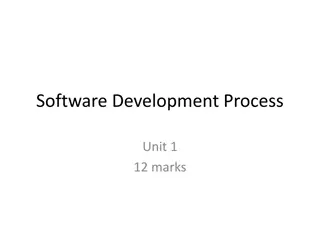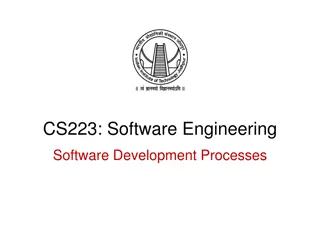Simplifying Method Calls in Software Construction
Learn about various refactorings to make method calls simpler in object-oriented software development. Explore techniques like renaming methods, separating queries from modifiers, parameterizing methods, and more to enhance code maintainability and readability.
Download Presentation

Please find below an Image/Link to download the presentation.
The content on the website is provided AS IS for your information and personal use only. It may not be sold, licensed, or shared on other websites without obtaining consent from the author.If you encounter any issues during the download, it is possible that the publisher has removed the file from their server.
You are allowed to download the files provided on this website for personal or commercial use, subject to the condition that they are used lawfully. All files are the property of their respective owners.
The content on the website is provided AS IS for your information and personal use only. It may not be sold, licensed, or shared on other websites without obtaining consent from the author.
E N D
Presentation Transcript
Software Construction and Evolution - CSSE 375 Below Be the character! The late acting teacher Lee Strasberg coaches a student into the role. We can do that, too. Be the software class! What would you do next? Making Method Calls Simpler Shawn and Steve
Making Method Calls Simpler Some Bad Code Smells Alternative Classes with Different Interfaces, Data Clumps, Long Parameter List, Primitive Obsession, Speculative Generality, Switch Statements Rename Method Add Parameter Remove Parameter Separate Query from Modifier Parameterize Method Replace Parameter with Explicit Methods Preserve Whole Object Replace Parameter with Method Introduce Parameter Object 1. 9. 10. Remove Setting Method 11. Hide Method 12. Replace Constructor with Factory Method 13. Encapsulate Downcast 14. Replace Error Code with Exception 15. Replace Exception with Test 2. 3. 4. 5. 6. 7. 8. 2
Why Make Method Calls Simpler? Objects are all about interfaces Need easy to understand and use interfaces in developing good object- oriented software Chapter 10 explores refactorings that make interfaces more straightforward Q1 3
Rename Method Situation: The name of a method does not reveal its purpose. Solution: Change the name of the method. Similarly, Add/Remove Parameter are simple and effective refactorings Q2 4
Separate Query from Modifier Situation: You have a method that returns a value but also changes the state of an object Solution: Create two methods, one for the query and one for the modification Q3 5
Parameterized Method Situation: Several methods do similar things but with different values contained in the method body Solution: Create one method that uses a parameter for the different values 6
Replace Parameter with Explicit Methods Situation: You have a method that runs different code depending on the values of an enumerated parameter Solution: Create a separate method for each value of the parameter void setValue (String name, int value) { if (name.equals("height")) _height = value; if (name.equals("width")) _width = value; Assert.shouldNeverReachHere(); } void setHeight(int arg) { _height = arg; } void setWidth (int arg) { _width = arg; } Q4 7 7
Preserve Whole Object Situation: You are getting several values from an object and passing these values as parameters in a method call Solution: Send the whole object instead int low = daysTempRange().getLow(); int high = daysTempRange().getHigh(); withinPlan = plan.withinRange(low, high); withinPlan = plan.withinRange(daysTempRange()); Similar idea in Introduce Parameter Object 8
Replace Parameter with Method Situation: An object invokes a method, then passes the result as a parameter for a method. The receiver can also invoke this method. Solution: Remove the parameter and let the receiver invoke the method int basePrice = _quantity * _itemPrice; discountLevel = getDiscountLevel(); double finalPrice = discountedPrice(basePrice, discountLevel); int basePrice = _quantity * _itemPrice; double finalPrice = discountedPrice(basePrice); Q5 9
Remove Setting Method Situation: A field should be set at creation time and never altered Solution: Remove any setting method for that field Similarly, Hide Method makes a public method private 10
Replace Constructor with Factory Method Situation: You want to do more than simple construction when you create an object Solution: Replace the constructor with a factory method Employee (int type) { _type = type; } static Employee create(int type) { return new Employee(type); } Q6 11
Encapsulate Downcast Situation: A method returns an object that needs to be downcasted by its callers Solution: Move the downcast to within the method Object lastReading() { return readings.lastElement(); } Reading lastReading() { return (Reading) readings.lastElement(); } 12
Replace Error Code with Exception Situation: A method returns a special code to indicate an error Solution: Throw an exception instead int withdraw(int amount) { if (amount > _balance) return -1; else { _balance -= amount; return 0; } } void withdraw(int amount) throws BalanceException { if (amount > _balance) throw new BalanceException(); _balance -= amount; } Q7 13
Replace Exception with Test Situation: You are throwing a checked exception on a condition the caller could have checked first Solution: Change the caller to make the test first double getValueForPeriod (int periodNumber) { try { return _values[periodNumber]; } catch (ArrayIndexOutOfBoundsException e) { return 0; } } double getValueForPeriod (int periodNumber) { if (periodNumber >= _values.length) return 0; return _values[periodNumber]; } Q8 14







